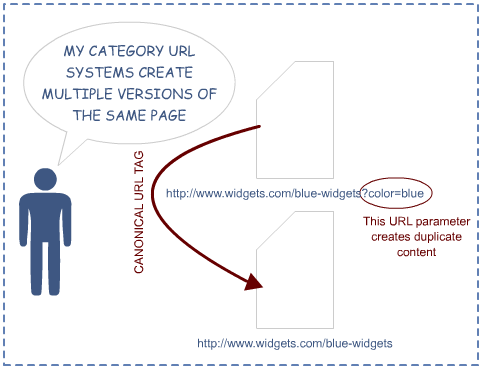
We’ve focused a lot on using the top SEO strategies to ensure that your content and website rank well. But have you ever wondered about your URLs? Do you really need to put a URL optimization strategy in place?
Well, yes. Your URL is typically the first thing Google and consumers see. URLs may seem like insignificant web page addresses for many people, but it contains far more information than just the web page address. Although it may appear less significant than the title and header, URL optimization may be a valuable SEO strategy.

URLs provide data and signals that help search engines understand the content, context, and intended audience. A high-quality URL is likely one of the essential ranking elements for an SEO professional.
This article will highlight some of the most significant elements to consider when creating a high-quality URL link.
What is URL Optimization?
URL optimization is a process in which we optimize a web page’s URL slug structure to make the web page more visible to search engine crawlers, resulting in improved SEO rankings in the SERP.

Optimizing your URLs for humans makes it simpler for search engine bots to crawl and index your site, resulting in more relevant material for searchers. Google uses URLs as a ranking element. This means that URL optimization increases the Google PageRank (PR).
10 URL Optimization Tips to Rank on SERPs
1. Every user must be able to read the URLs
Ensure your URLs are as readable as possible. There should be no codes or IDs, just simple English words. This makes it easier to remember URLs and determine if the page you arrived at has valuable content for your query.

Search engines can’t or won’t decode wacky, dynamically created URLs. Instead, they just read the words in URLs just as they would any other page’s content. This allows them to comprehend your content better and connect you with your target audience.
2. Make use of your primary keyword
You should have a primary keyword in the URL of every page on your website to rank in the search engines. The primary keyword must ideally be on the web page and popularly used by individuals seeking information on the website.

However, note that just having the primary keyword in the URL is insufficient. Suppose the web page is for an article or blog post. In that case, you may generally extract the important words in the title to create a powerful heading that incorporates the main keyword and summarizes what’s on the page.
3. Use lowercase letters instead of capitals
Ensure that every domain, folder, and page in your URL uses lowercase letters.
An Internet address is case-sensitive for words that appear after a domain name. For instance, www.peppercontent.io is the domain name.
So, the words that appear after the domain name depict the specific web page within the website – for example, the blog – and must be in lower case. Hence the address should be www.mydomain.com/blog and not www.mydomain.com/Blog. In such a case, the search engine will not recognize the address and can put up a 404 error message.
4. Do not change an existing URL
After reading all of the above strategies, you might be tempted to modify all your URLs to make them as search-engine-friendly as possible. Do not give in to this temptation.
Just remember these guidelines in the future, and you’ll be OK. Unless you are an expert at 301 redirects, this might harm your SEO strategy. You’ve put in a lot of effort to have your URLs crawled, and if you alter them now, it’ll all be for naught.
5. Use hyphens to separate words
It would be simpler to understand your URL if you used hyphens to separate the words. Both the user and the search engine will grasp the different terms in the URL and understand what the website is about.
Use underscores sparingly. When the URL is underlined, it can’t be read, making the hyperlink more challenging to read.
6. The URL should be short and simple
Short and to-the-point URLs are ideal. Avoid stuffing your URL with unnecessary words or characters, and avoid keyword stuffing. It’s pointless to include the same term many times in your URL.
While most of your users will access certain pages of your website via links or bookmarks rather than going straight to the URL, you want it to be conceivable that someone might recall a particular URL if they wanted to.
7. Add your mobile URLs to a sitemap.
Search engines can use this to determine which web pages are mobile-friendly and which are not. Since the Google mobile upgrade, the first ones appear to be ranking higher in the SERPs.
Even though some experts argue that responsive URLs do not require inclusion in a sitemap, it is safer to do so.
8. Use robots.txt to block bad URLs
Block search engines from indexing numerous URLs to the same content and other problematic URLs to avoid penalizing duplicate content.
For example, depending on the user’s narrowed search, having a search tool on your site creates dynamic and duplicate URLs for the same material. Block extra dynamic URLs linking to the canonical URL.
9. Create a favicon for your website
A favicon is a little icon that appears next to your URL in a browser. Bing and Google have experimented with favicons in their search results. Favicons also stand out more in browser bookmarks, making it easier to recognize and trust a brand.
Although there is no direct SEO cause and effect from having a favicon on your site, there is a clear association. Overall, having one is preferable.
10. Wherever possible, use canonical tags
This section is a little more technical, but it’s still crucial. You don’t want Google to distinguish between multiple versions of the same page on your website. As a result, if the same web page is linked to many URLs for whatever reason, its SEO value is diluted.

There are situations where your website may have different addresses; for example, http://yourwebsite.com, www.yourwebsite.com, https://yourwebsite.com, and so on. By adding a canonical tag to the primary address, you are letting search engines know that it is the main one and can be selected as the master address out of all the other duplicates. This prevents issues with duplication and bad SEO.
URLs are the foundation of your website, and creating a standard URL optimization might take some time and effort. But once you’ve got that down, choosing the proper URL for each web page on your site can be one of the most straightforward aspects of on-site SEO.
Make sure your URL optimization gives remarkable results. It’s a simple method to enhance your SEO. URL structure optimization may help you increase visitors. Clean URLs are simpler to share, perform better in searches, and look more trustworthy.
For services relating to SEO, visit our service page.
Key Takeaways
- URLs provide data and signals that help search engines understand the content, context, and intended audience of a page. URL optimization may be a valuable SEO strategy.
- A high-quality URL is likely one of the essential ranking elements for an SEO professional. These are the key elements to consider when creating a high-quality URL link.
- URL optimization is the practice of improving a web page’s URL structure to make it more understandable to search engine crawlers.
- Each page on your website should have a primary objective keyword that you want it to rank for in the search engines.
- Use lowercase characters instead of uppercase ones in URLs
- Using hyphens to separate words is a good idea. It can’t be read when underlined, making the hyperlink more difficult to read.
- The URL should be brief and straightforward. Avoid cramming your URL with extra letters or words.
- A sitemap should include your mobile URLs. The first ones appear to be ranking higher in the SERPs since Google’s mobile change.
- To prevent malicious URLs, use the robots.txt file.
- Your website’s URL optimization might be a helpful SEO technique. To avoid having numerous versions of the same page on your site, use canonical tags.
FAQs
URLs are important because keywords in the URL are a ranking factor, and concise and informative URLs may aid in link development and user interaction.
URL structure optimization is an effective way of informing a potential site visitor about a page’s content. Wherever links are shared, appropriate usage of URLs can boost click-through rates. Shorter URLs are also more consumer-friendly and easier to distribute.
SEO URLs are created to meet the demands of users and search engines. URLs that are optimized for SEO are often short and keyword-rich.
Shorter SEO URLs not only rank higher in search results, but they are also much easier for people to write, resulting in a better customer experience.
SEO URLs should aim for a character count of 50 to 60. If you go too far (for example, 80 characters or more), your rating will likely suffer.
Latest Blogs
Explore how Google’s 2025 AI search updates triggered ranking chaos. Learn actionable strategies to adapt your SEO for AI Overviews, zero-click searches, and SERP volatility. Stay ahead now.
Learn how to rank on AI search engines like ChatGPT, Perplexity, and Gemini by optimizing your content for authority, structure, and relevance. Stay ahead in AI-driven search with this strategic guide.
Explore the best healthcare SEO services for your medical practice. Improve online visibility and effectively reach more patients in need of your services.
Get your hands on the latest news!
Similar Posts

Artificial Intelligence
6 mins read
The Role of AI in Digital Marketing: AI Article Generators Transforming Content Creation

Artificial Intelligence
4 mins read
How AI Content Creator Is Shaping the Future of Digital Content

Digital Marketing
3 mins read